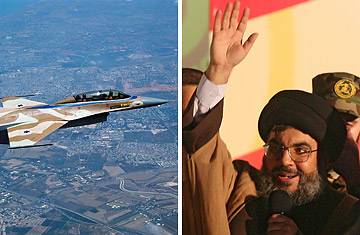
Left, an Israeli F16 AC and Hizballah leader Hassan Nasrallah.
Ever since they fought to a tie in their 2006 clash in southern Lebanon, Israel and Hizballah have assumed they will tangle again. And the date of their rematch may be drawing closer if some of the rhetoric on both sides is to be believed.
Israeli Defense Minister Ehud Barak, on a trip to the United States this week, has been warning officials that Hizballah's rocket arsenal has "doubled if not tripled" since the end of the monthlong war in the summer of 2006, during which the militia of the Shi'ite movement fired thousands of rockets into the Jewish state. "Israel considers this to be a real and serious danger," Barak said.
But Hizballah has complaints of its own, this week accusing Israel of repeatedly violating Lebanese sovereignty on land, sea and particularly in its airspace, which is breached almost daily by Israeli jets and reconnaissance drones.
"The Israeli enemy's persistence in its violations of Lebanese airspace, territorial waters and territory, especially during the past few days, is an unacceptable provocative escalation that calls for condemnation and serious action on the part of the concerned Lebanese authorities as well as the U.N. bodies," the Islamic Resistance, Hizballah's military wing, said this week in its first statement since the 2006 war.
The tenor of Hizballah's statement has some analysts predicting trouble. "I think they are oiling up their 57-mm guns again," said Timur Goksel, a Beirut-based Middle East security analyst and former senior official with the United Nations peacekeeping force in southern Lebanon. He was referring to the antiaircraft cannons used by Hizballah a few years ago to fire shells across the border into Israel in a tit-for-tat response to Israeli incursions into Lebanese airspace.
"The Israeli overflights have increased lately, and it looks like the Israelis are provoking Hizballah into showing their deployments," Goksel said.
Since the conclusion of a prisoner swap between Israel and Hizballah two weeks ago, the Shi'ite group's leaders have said they will now concentrate their efforts on other outstanding grievances. Other than the aerial and maritime violations, these include the Israeli occupation of the Shebaa Farms, a remote mountainside running along Lebanon's southeast border that is claimed by Lebanon, as well as a continued Israeli troop presence in the northern, Lebanese, half of Ghajar village, which straddles the border.
Hizballah maintains that armed resistance is the only effective leverage against Israel, but it has said it is willing to give diplomatic efforts a chance to resolve the violations of Lebanese sovereignty. Still, analysts warn, the Islamic Resistance statement appears to be aimed at justifying future military action.
"They are allowing diplomacy a chance in order for it to fail," said Amal Saad-Ghorayeb, a Beirut-based specialist on Hizballah. "By filing a quite unprecedented complaint, they are holding the U.N. and the Lebanese government accountable, which means Hizballah is paving the way for a [military] response."
Recent press reports in Israel claimed that Hizballah has been deploying radar-guided antiaircraft missile systems in eastern Lebanon's Bekaa Valley in preparation to shoot down Israeli jets. Some of these reports asserted that missile batteries have been installed on the summit of Mount Sannine, an 8,700-ft. mountain that overlooks Beirut and the Mediterranean to the west and the Bekaa Valley to the east. When TIME trekked up Sannine's summit recently, it found nothing but sheets of frost-shattered limestone baking in the sun. The only signs of life were distant flocks of goats and the occasional lone eagle floating on the thermals high above.
Hizballah possesses a formidable arsenal, including long-range artillery rockets, shore-to-ship cruise missiles and laser-guided antitank missiles. But the group has yet to find a means of challenging Israel's control of Lebanese skies. Hizballah officials acknowledged privately after the 2006 war that they had been disappointed by the performance of their antiaircraft weaponry and were looking to rectify the deficiency. Whether they have acquired new antiaircraft weapons systems remains unknown. But even if they have, Hizballah may not wish to prematurely expose its new capability by shooting down an Israeli jet solely for a propaganda coup.
"They need to keep some surprises left in case of another war," said Saad-Ghorayeb. "There are other actions they can take."
Hizballah also has to contend with a challenge from its Western-backed domestic opponents who question the group's continued bearing of arms. Division over Hizballah's weapons has deadlocked a ministerial committee charged with formulating a policy platform for the new government of national unity, in which Hizballah and its allies have a veto-wielding one-third share. The fate of Hizballah's weapons will top the agenda when Lebanon's leaders convene shortly to negotiate a national defense strategy. It promises to be a tough debate. Hizballah intends its right to bear arms to be codified as part of Lebanon's national defense plan, while its opponents hope to clip the organization's military wings by giving the state a monopoly of force — and thereby the sole power to decide issues of war and peace.
If Hizballah is thinking of launching missiles at Israeli jets or warships cruising the Lebanese coast, or of launching an attack in the Shebaa Farms, it will have to carefully calculate Israel's expected response. In July 2006, Hizballah's abduction of two Israeli soldiers triggered a 34-day war that cost over 1,200 Lebanese lives. Although Hizballah fought the Israeli army to a standstill in southern Lebanon and claimed a "divine victory," it appears to be in no hurry to repeat the experience.
"The Resistance's role is to stand against any Israeli greed and assaults that may take place at any moment," said Hussein Khalil, senior advisor to Hizballah chief Sheikh Hassan Nasrallah on Wednesday. "We, definitely, are not declaring that a war might take place." Good news for those Lebanese hoping for a quiet summer for a change.
